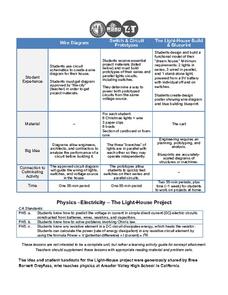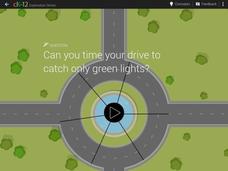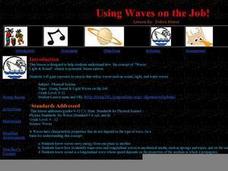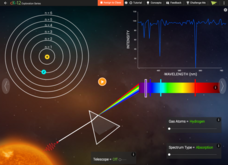CK-12 Foundation
Light Wave
Do radio waves create light? It's more difficult to understand the things we can't see than those that we can. The simulation compares the relatively small range of visible light to the entire electromagnetic spectrum. It graphs the size...
CK-12 Foundation
Least Time
What is the fastest way to get from point A to point B if you are going through two different mediums, such as air then water? Scholars explore the way light travels through air, water, acrylic, glass, and diamond as they answer this...
CK-12 Foundation
Flashing Neon Light
How does a neon light work and does it actually contain the gas neon? An enlightening simulation encourages pupils to play with circuits and neon lights. They control the capacitance, resistance, and color of the bulb, and the simulation...
Trash For Teaching
The Light-House Project
Groups work together to design a lighthouse, from designing and drawing the wiring diagram, to creating prototypes of the switch and circuit, to envisioning and building a scale model along with a blueprint. By including different...
Curated OER
What is Science?
Young scholars explore physical science by conducting a plant experiment. For this scientific method lesson, students discuss questions scientists ask in order to properly explore certain subjects. Young scholars utilize two plants and...
CK-12 Foundation
Rose Colored Glasses
How can we change the color of what we are seeing? The simulation allows individuals to change the color of a car's paint, the color of light pointed at the car, and the color of glasses the person is wearing. Each combination creates a...
CK-12 Foundation
Diamond Cut
How do jewelers tell the difference between diamonds, glass, and cubic zirconia? A sparkling simulation demonstrates how to use a ray of light to determine the substance and ideal shape for a diamond. Scholars control the material,...
CK-12 Foundation
Angular Speed Simulation
Can you time the speed of your car perfectly so you only hit green lights? The challenge in the simulation is to alter the timing of the lights or the speed of the car in order to do just that. Scholars learn about angular speed as they...
CK-12 Foundation
Contact Lens
How do contact lenses work? The simulation allows young scientists to explore focal length and lens type to see how and why contact lenses work. Pupils control the focal length for an eye and a lens, the type of lens, and the distance...
CK-12 Foundation
Black Hole
What happens to radio waves, time, and light in and near a black hole? Young scientists explore what is known about observing frequency and time at various distances from a black hole. They control the size of the black hole and the...
Curated OER
Invisible Rays
Students explore physical science by completing a lab assignment. In this sunlight lesson, students define a list of scientific vocabulary terms and complete fill in the blank questions. Students conduct a photographic experiment in...
Curated OER
Using Waves on the Job!
A colorful and comprehensive PowerPoint highlights this lesson on waves. Junior geophysicists pretend that they are hired to analyze seismic waves. A worksheet is provided to go along with an online article about how compact discs work...
Curated OER
Kaleidoscope
Students explore energy by creating a light project in class. In this kaleidoscope lesson, students discuss the properties of light and how mirrors can reflect the energy in different directions. Students view a diagram of light...
NOAA
Ocean Zones
How can organisms light up in water? Bioluminescence is light produced in a chemical reaction that can occur in an organism's body. First, learners determine what happens to light/color as you move into the deep ocean. In groups, they...
CK-12 Foundation
Atomic Colors
Stars are too hot to visit, so how do we know what different stars are made of? An enlightening simulation uses a spectrum graph to show the various electron emission and absorption reactions. Scholars experiment with both helium and...
PHET
Band Structure
Electricity travels at the speed of light, 186,000 miles per second. Through a simulation, classes see how the structure of energy bands in crystals of atoms determines how materials conduct electricity. Participants can change the...
Wild BC
The Greenhouse Effect: The Role of CO2
Though this is meant to be second in a two-part instructional activity, the two are not dependent on each other. Pupils play the roles of visible light rays, light or dark surfaces, and carbon dioxide molecules. They interact and react...
Curated OER
Lighten Up!
Third graders observe light as a form of energy, that it can be reflected/bounced, refracted/bent and absorbed. They explore how different types of light affect our lives as a whole. Songs are researched that involve light (ex. "You...
NOAA
Biological Oceanographic Investigations – Through Robot Eyes
How can a robot measure the length of something when we don't know how far the camera is from the object? The lesson explains the concept of perspective and many others. Scholars apply this knowledge to judge the length of fish and the...
Curated OER
The Greenhouse Effect in a Jar
Students explore climate change by participating in a physical science experiment. In this greenhouse effect lesson, students discuss the impact global warming has on our environment and how it works. Students utilize a glass jar,...
Curated OER
Model Rockets
Students build a model rocket. In this model rocket lesson, students explore a rocket launch cycle. Students investigate the laws of physics for each part of the launch. Students build model rockets and launch at school.
Curated OER
Photosynthetic Pictures--Are Worth More Than a Thousand Words
Students observe and examine how carbon dioxide, water, and light produce glucose/starch through a process called photosynthesis.
Curated OER
Howdy Neighbor
Students role play a power grid set up to show how increased load affects the grid. In this physics lesson plan, students explain the importance of electricity in their daily lives. They identify the key components of the power grid.
CK-12 Foundation
Flashlight
In a simple circuit, does electricity start instantly? A simulation encourages thinking about the flow of electrons at a microscopic level. Pupils control the voltage, resistance, and switch in order to observe the change in both ideal...























